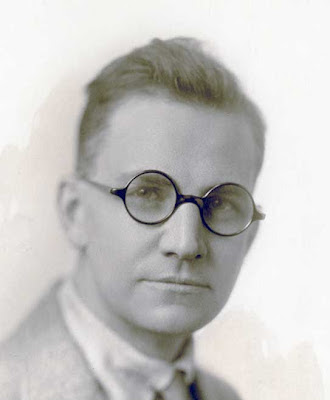Ernest William Watson was a pencil artist, watercolorist, print
maker, author, and teacher. He co-founded
Watson-Guptill Publications; the magazine, American Artist; and The Berkshire Summer
School of Art, in Monterey, Massachusetts, one of the first summer art schools
in the country. (Click here for two of the many links for Ernest: http://www.americanlegacygallery.com/artistPage.php?aid=102&cid=6 OR http://americanart.si.edu/collections/search/artwork/results/page=1&num=10&image=0&view=0&name=&title=&keywords=&type=&subject=&number=&id=5255)
Ernest was not content to simply practise his art. It seemed to me his entire career demonstrated
that, besides his passion for art and art-making, he had a tremendous desire to communicate
and pass that passion on to others.
He continued that tradition with me. From the time I was a child, and I
began to visit him in New York, he followed my artistic development with
interest and encouragement; took me to the city's many museums; presented me
with special books that he thought would interest and intrigue me.
But he didn't stop at art. On those visits he also gave me my first cup of tea. Shared with me his love of
blueberries. Introduced me to
crystallized ginger.
My father (Aldren Auld Watson, author of WATERFRONT NEW YORK: Images From the 1920s and 30s to be published by David R.Godine fall 2012) often told of how, when he was young, he and his
father initiated a Saturday morning challenge for themselves: together they would make biscuits for
breakfast in as short a time as possible---and they would attempt each Saturday
to beat their time from the week before. With my father's permission, I reproduce here his account, and his sketch, of one of those Saturday mornings:
Biscuits:
Rolled or Dropped
Father
pulls out his Hamilton railroad watch: "Five of seven Saturday morning;
let's do it."
I
already did most of it---yesterday afternoon. I had split a load of special kindling and thin firewood and
filled the woodbox with it. All
bone-dry chestnut from those telephone poles. Enough for two or three ordinary days.
I
nod, life off the left-hand stove lid, jab the cold ashes with the poker. I wad up a couple sheets of newspaper,
drop them into the firebox. Then I
build a criss-cross pile of kindling with skinny pieces of the chestnut about
the thickness of your little finger, thicker ones on top. Strike a wooden match, drop it into the
pile, slide the stove lid back into place and open the damper to quick-start
the draft. Three minutes later
shut the damper, add a handful of chestnut. It snaps and crackles like firecrackers.
Father
is ahead of me, ahead of the fire, too.
All the makings are in the big brown crockery bowl and he's beating away
with a wooden spoon. I take a look
and see that the oven needle is creeping up, 250 now. Lift the front stove lid, shove in another bunch of chestnut
sticks. Fire is really
popping. The teakettle, always
sitting on the back of the old Glenwood, starts to hum her tune. Needle is almost touching 400 now,
almost time. Lift the lid, drop in
six or seven sticks, clap the lid back in place.
Father
stands by, biscuit cutter in one hand, and in the other his cookie sheet with
eighteen biscuit cutouts lined up on it.
I'm watching the oven door thermometer. So is he. The
needle hits 450, and with the pot holder I grab the oven door, Father slides
his cookie sheet onto the top rack, claps the door shut.
"Seven
fifteen," he says.
"Right on time."
Every
couple of minutes I lift the stove lid with my left hand, and with my right,
quickly slide in a few thin sticks of chestnut, and quickly replace the
lid. I look at the oven door. Just a whisker below 450.
"Seven
twenty-three," says Father.
The fire sounds like popcorn popping. Father has to have a look. He opens the oven door, glances inside, then pulls out the
cookie sheet, looks at the Hamilton, and exclaims,
"Thirty
minutes, start to finish. And
golden brown, too!"
I don't know what recipe my grandfather used, so I include
here my own favorite from my old JOY OF COOKING:
Buttermilk Biscuits
Sift before measuring: 1 3/4 c all-purpose flour (or 2 c cake
flour), 1 tsp salt, 2 tsp baking powder, 1 tsp sugar, 1/2 tsp soda. Cut in: 5 Tbls butter. Add: 2/3 c to 3/4 c buttermilk. Mix
very lightly, turn out onto floured board, knead very slightly and
gently---only 5 - 6 turns. Pat
dough to thickness of 1/4 inch. Cut out. Bake 10-12 minutes at 450 degrees.
As I make biscuits---or art---I like to remember my
grandfather's beliefs:
You can always improve
Food and art are both important
Have fun





Wendy, I CANNOT WAIT to meet you! You are fabulously entertaining. The energy in your family stories plumps me up like a dry sponge.
ReplyDeleteUntil June...
what a wonderful post. you bring us right along with you with every word, from bathroom to kitchen and beyond. thank you.
ReplyDelete